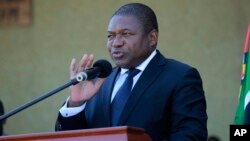Beginning Wednesday, journalists working in Mozambique are scheduled to start paying what may be the highest registration fees in the world.
The new fees have been widely criticized, with Human Rights Watch calling them “outrageous,” and Amnesty International saying they will keep the media from reporting on Mozambique.
A foreign correspondent living in the southeast African country would have to pay $8,300 a year, and a new national radio station would be charged $35,000. Local journalists reporting for foreign media would be charged $3,500 for annual accreditation in a country whose gross domestic product, per capita, is $1,200.
“We think that this is completely exorbitant and out of any reasonable proportion,” said Arnaud Froger, who heads the Africa desk for the watchdog group Reporters Without Borders.
“It affects those media outlets with very high license fees that are very likely to kill off lots of Mozambiquan radio and TV channels,” he told VOA when interviewed by phone Monday from Paris. “And journalists as well are not going to be able to pay the price to report. I mean, who is going to [spend] about 2,500 U.S. dollars to go reporting for a week or two in Mozambique? Is there any foreign freelance reporter willing to pay about 8,500 U.S. dollars to settle in Mozambique?
“We really fear that the country may become a kind of foreign media desert,” Froger added.
He called the government move an attempt to shut down coverage of Mozambique a month before municipal elections and a year ahead of the 2019 presidential vote.
Mozambique’s government has defended the fees as a response to market circumstances and the need to impose discipline on the media.
Sixty percent of the fees will go to the federal budget, with the government information office getting the rest.




